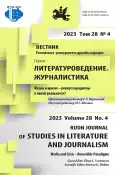Modeling the media educational potential of the television industry as a post-crisis phenomenon
- Authors: Yefanov A.A.1,2, Pugachev M.A.3,4
-
Affiliations:
- Russian State University for the Humanities
- HSE University
- Orenburg State University
- State TV and Radio Company “Orenburg”
- Issue: Vol 28, No 4 (2023): Media and Crisis – Reversible Paradigms
- Pages: 830-841
- Section: JOURNALISM
- URL: https://journal-vniispk.ru/2312-9220/article/view/319118
- DOI: https://doi.org/10.22363/2312-9220-2023-28-4-830-841
- EDN: https://elibrary.ru/ASKIFV
- ID: 319118
Cite item
Full Text
Abstract
The modeling of the media educational potential of the television industry as a post-crisis phenomenon is considered. The complex of theoretical and empirical approaches such as modeling, case-study, semi-structured expert interviews was used. According to the results of this research, the fact that the television industry has the media educational potential and employs it in the professional activity is confirmed. There are three models of the media educational potential of the television industry (MEPTI), that are determined by differentiated professional aims: MEPTI in the media training of professionals; MEPTI in the qualification improvement of professionals; MEPTI in improving media literacy of broad audience. The realization of media educational potential is seen in federal and regional segments of the television industry, regardless the type of media companies. However, different forms of media educational potential are applied by the television industry that is seen not only in the collaboration with universities, but also in the autonomisation of media educational practices.
Keywords
About the authors
Aleksandr A. Yefanov
Russian State University for the Humanities; HSE University
Author for correspondence.
Email: yefanoff_91@mail.ru
ORCID iD: 0000-0002-9979-9224
Candidate of Sociological Sciences, Associate Professor, Associate Professor of the Department of the Theory and Practice of Public Relations, Russian State University for the Humanities; Associate Professor of the Institute of Media, HSE University
20 Myasnitskaya St, Moscow, 101000, Russian FederationMaksim A. Pugachev
Orenburg State University; State TV and Radio Company “Orenburg”
Email: pugachevma@mail.ru
ORCID iD: 0000-0001-6255-7646
senior lecturer, Department of Journalism, Orenburg State University; Chief Editor, Information and Thematic TV and Radio Programs Service, State TV and Radio Company “Orenburg”
13 Prospekt Pobedy, Orenburg, 460018, Russian Federation; 3 Televizionnyi Pereulok, Orenburg, 460024, Russian FederationReferences
- Blokhin, I.N., Ilchenko, S.N., & Shesterkina, L.P. (2016). Media identity in structure of personality: Formation and typology. American Journal of Applied Sciences, 13(5), 665-673. https://doi.org/10.3844/ajassp.2016.665.673
- Fateeva, I.A. (2019). On the international recognition of domestic newspaper science. Proceedings of the Ural Federal University. Series 1: Problems of Education, Science and Culture, 25(4), 14-22. (In Russ.)
- Fedorov, A. (2019). Schools and universities in audiovisual media: Experts’. Communication Today, 10(1), 110-122.
- Kachkaeva, A., Kolchina, A., Shomova, S., & Yarovaya, E. (2020). ‘Trust, but verify’: Problems of formation of media literacy and critical thinking of Russian students. Media Practice and Education, 21(3), 200-211. https://doi.org/10.1080/25741136.2020.1752569
- Karasevich, U.M. (2004). Interaction between University and television and radio company as the factor of forming professional competence of students-journalists (dissertation of the Candidate of Pedagogical Sciences). Orenburg. (In Russ.)
- Kirillova, N.B. (2020). Media culture of a globalised world: Evolution of language technologies. Changing Societies & Personalities, 4(4), 427-440. https://doi.org/10.15826/csp.2020.4.4.109
- Lee, H.-K. (2022). Rethinking creativity: Creative industries, AI and everyday creativity. Media, Culture & Society, 44(3), 601-612. https://doi.org/10.1177/01634437221077009
- Oleshko, V.F., Oleshko, E.V., & Mukhina, O.S. (2021). The problem of self-identification of student journalists of the digital era. Moscow University Bulletin. Series 10: Journalism, (4), 135-157. (In Russ.) https://doi.org/10.30547/vestnik.journ.4.2021.135157
- Sharikov, A.V. (2016). On the four-component model of digital literacy. Journal of Social Policy Research, 14(1), 87-98. (In Russ.)
- Shesterkina, L.P. (2011). Forming of innovative model in journalists’ training in terms of forming convergent mass media (humanitarian and technological aspects) (dissertation of the Doctor of Philology Sciences). Мoscow. (In Russ.)
- Shesterkina, L.P., Lobodenko, L.K., Krasavina, A.V., & Marfitsyna, A.R. (2021). Fact-checking and verification of information in the context of journalism education. Questions of Theory and Practice of Journalism, 10(1), 94-108. (In Russ.) https://doi.org/10.17150/2308-6203.2021.10(1).94-108
- Volkova, I.I., Urazova, S.L., & Pisareva, M.N. (2020). Criteria for the formation of communicative space in the student environment: Immersion in creativity. Scientific Notes of Zabaikalsky State University, 15(1), 75-81. (In Russ.) https://doi.org/10.21209/2658-7114-2020-15-1-75-81
- Volkova, I.I. (2019). TV channels on YouTube: Reasons for inefficiency. Journalism in 2018: Creativity, Profession, Industry: Proceedings of the International Scientific and Practical Conference (pp. 468-469). Moscow: MGU Publ. (In Russ.)
- Volkova, I.I., Proskurnova, E.L., & Tran, T.T. (2021). Prospects of news television: Materials of in-depth interviews. Nauchnyi Dialog, (3), 157-170. (In Russ.) https://doi.org/10.24224/2227-1295-2021-3-157-170
- Yefanov, A., & Pugachev, M. (2023). Media educational potential of the television industry: Towards the conceptualization of the media communication category. Media Education, (1), 190-202. https://doi.org/10.13187/me.2023.1.190
- Yefanov, A.A. (2021). Society at the mercy of media processes. Moscow: INFRA-M Publ. (In Russ.) https://doi.org/10.12737/1140665
- Young, J.A., & Ronquillo, R. (2022). Enhancing new media literacies of social work students through a participatory learning environment. Journal of Technology in Human Services, 40(1), 58-78. https://doi.org/10.1080/15228835.2021.2004572
- Zhilavskaya, I.V., Onuchina, K.K., & Dubover, D.A. (2020). The design of depressed cities in the far north and their image in media space after the implosion of the USSR. Visual Anthropology, 33(2), 164-176. https://doi.org/10.1080/08949468.2020.1721199
Supplementary files









